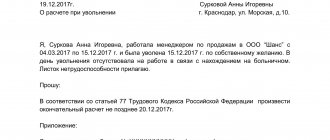Article 127 of the Labor Code of the Russian Federation. Exercising the right to leave upon dismissal of an employee (current version)
1. Monetary compensation upon dismissal of an employee must be paid to him for all vacations not used by him by the day of dismissal, regardless of their total duration and on what grounds the employment contract is terminated.
2. When calculating monetary compensation for unused vacation, the same rules must be applied as when calculating earnings for vacation (see commentary to Article 139).
3. At the request of the employee, on the basis of his written application, instead of compensation for unused vacation, he may be granted vacation in kind followed by dismissal (except for cases of dismissal for guilty actions). It should be borne in mind that the employer has the right, but not the obligation, to provide the employee with leave with subsequent dismissal at his request.
If an employee is granted leave with subsequent dismissal, the day of dismissal will be considered the last day of leave. This date (the last day of vacation) is also entered in the work book as the date of dismissal. However, all settlements with the employee, incl. the issuance of a work book and other documents must be made on the last day of work (see commentary to Article 84.1). At the same time, the employer, in order to properly fulfill the obligation established by the Labor Code to formalize the dismissal and settle payments with the dismissed employee, must proceed from the fact that the employee’s last day of work is not the day of his dismissal (the last day of vacation), but the day preceding the first day of vacation (see. Determination of the Constitutional Court of the Russian Federation dated January 25, 2007 N 131-О-О).
4. Providing unused leave with subsequent dismissal is not allowed in cases where an employee is dismissed for guilty actions, for example, absenteeism; appearing at work in a state of alcohol, drug or other toxic intoxication; committing theft of someone else's property at the place of work; disclosure of secrets protected by law (see commentary to Article 81).
5. Unused vacation followed by dismissal may be granted to an employee upon his written application and in cases where the basis for dismissal is the expiration of the employment contract and the vacation period completely or partially extends beyond this period. The day of dismissal in this case will also be the last day of vacation, and not the day of expiration of the employment contract.
For example, the employment contract expires on 02/01/2013 (last day of work). The employee requests, in connection with the termination of the employment contract with him, to provide him with unused vacation of 25 calendar days with subsequent dismissal. The day of dismissal will be 02/27/2013.
6. In the event that unused vacation followed by dismissal is granted to an employee who resigns of his own free will, he has the right to withdraw his resignation, but provided that the vacation has not yet begun and if another employee is not invited to take his place by way of transfer ( see commentary to Article 64).
7. In the practice of applying Art. 127, the question arose whether an employee has the right to demand an extension of leave granted with subsequent dismissal if he fell ill during the leave period. We believe that the answer to this question should be negative, since in reality (in fact) the employment relationship with the employee is terminated from the moment the vacation begins. This conclusion is confirmed by the rules of Part 4 of Art. 127, according to which an employee who has been granted unused leave with subsequent dismissal on his own initiative does not have the right to withdraw his resignation after the start of the leave, even if it is only the first day of leave.
By expressing a desire to receive leave followed by dismissal, the employee thereby expressed a desire to terminate the employment relationship with the employer (if dismissed at his own request) or agreed with the legality of its termination (if dismissed for other reasons). Therefore, it should be assumed that from the moment the vacation begins, the employer does not bear any obligations to the employee who received vacation with subsequent dismissal, and, therefore, the rules for extending annual paid leave, provided for in Part 1 of Art. 124 of the Labor Code do not apply to such employees.
Comment source:
Rep. ed. Yu.P. Orlovsky “COMMENTARY ON THE LABOR CODE OF THE RUSSIAN FEDERATION”, 6th edition ACTUALIZATION
ORLOVSKY Y.P., CHIKANOVA L.A., NURTDINOVA A.F., KORSHUNOVA T.YU., SEREGINA L.V., GAVRILINA A.K., BOCHARNIKOVA M.A., VINOGRADOVA Z.D., 2014
Realization of the right to rest
People registered in any company on an official basis must not only work, but also periodically recover and rest. To do this, they have the right to take annual leave. Its duration cannot be less than 28 days, and it can also be divided into several parts. This period is paid.
Right to vacation
Article 127 of the Labor Code of the Russian Federation contains basic information on how to properly provide rest to employees of various enterprises. The rules of this process include:
- Every year at the beginning of each year, the employer draws up a schedule on the basis of which all specialists go on vacation;
- citizens can participate in the process of forming this document by making their own adjustments;
- the first period is provided only after 6 months of official work in the company;
- it is possible to grant rest ahead of schedule, but this is only possible if an agreement is drawn up between the parties (in addition, in this case the specialist undertakes to work for the company for longer than six months);
- Before the expiration of 6 months, going on vacation is permitted only to pregnant women, minors, or in other situations provided for by the company’s local regulations or legal requirements.
It is important to know! Every organization uses a sequence that all employees follow. For this purpose, a schedule is formed, which is an official document. When going on vacation, this paper does not even require you to draw up an application addressed to the head of the company.
How are unused rest days calculated?
Every year, people must rest for at least 28 days, and some specialists can expect an increase in the period. Article 127 of the Labor Code contains information on what an employer can do if an employee quits before using all the vacation. Compensation is offered for this purpose. To calculate it, it is important to determine how many days of rest a particular specialist has left.
The Labor Code does not contain a precise procedure for calculating this indicator. But you need to use special annexes to this act. For example, if a citizen has worked for a company for more than 11 months, then he is entitled to full compensation. There are some situations in which, even with a shorter period of work, the total amount of payment is assigned.
You can determine the indicator using the usual formula: number of vacation days = (number of months of work in the company * 28) /12. The resulting value is multiplied by the average salary per day.
For example, a citizen has worked for a company for more than two years. He decides to change his job, for which he submits a resignation letter. This year he worked for 9 months, so he can count on the following number of vacation days: 28*9/12=21.
There are additional explanations from Rostrud, according to which 2.33 days of rest are provided for each month of work. This indicator is determined by the following formula: 28/12. The final value can be calculated by multiplying 2.33 by the number of months during which the citizen worked since the beginning of the year. But this approach is rarely used by employers, as it is considered irrelevant and can worsen the employee's situation.
How much is the worker's compensation payment?
Compensation for remaining vacation days will always vary. Its calculation is carried out depending on several indicators:
- average earnings;
- number of vacation days.
Usually the employer's accounting department is responsible for calculating the amount. The more unused rest days an employee has left, the more impressive the amount will be.
To calculate cash payments, you need to multiply your average earnings by the number of unused vacation days. The amount received is payable net of taxes.
Taxes and fees
Since compensation is considered the employee’s income, personal income tax must be withheld from it in the required amount of 13%. In addition, the employer is required to make all standard payments from the employee’s earnings to the advisory funds.
Accrual terms
Usually, calculation and accrual of payments do not take much time. After drawing up the order and transmitting it to the accounting department, a short period of time passes. Payment is made immediately after accrual or along with the standard monthly payment.
In the vast majority of cases, such compensation is reimbursed along with the employee’s salary.
Is compensation included in average earnings?
For further calculation of any indicators, average earnings are often taken. Does it include compensation for the remaining days of rest? Definitely, yes, since these funds are the employee’s income received as a result of work activities. Average earnings do not include social payments.
Employer's liability for non-payment of money
The employer is always responsible for failure to pay employees. If payment is not made on time, especially when an employee is dismissed, then he has the right to appeal to several authorities:
- labor authority;
- court.
If the payment is delayed, the employer faces an audit, a fine and payment of a penalty for late payment.
As a result, compensation may be paid for unused vacation. This usually happens when the employee is dismissed and the final payment is made. However, in some cases, employees may receive money for unused vacation days. This must be agreed upon with the employer and documented.
Compensation upon dismissal
The Labor Code does not establish a rule for calculating compensation upon dismissal. Therefore, employers should be guided by the old document - “Rules on regular and additional leaves” (approved by the People's Commissariat of Labor of the USSR on April 30, 1930 No. 169).
In the Rules, it is important to pay attention to clause 35, which states that “when calculating the terms of work that give the right to proportional additional leave or compensation for leave upon dismissal, surpluses amounting to less than half a month are excluded from the calculation, and surpluses amounting to not less than half a month, rounded up to a full month.”
In connection with this rule, the question may arise: how to count half of the month in February, which, as you know, has 28 days? You need to focus not on the calendar month, but on the working month, since vacation is provided for the working year.
Let's say you hired an employee on September 17, 2021. He will retire as of November 30, 2021.
The employer needs to see how many full months the employee has worked. The first two months were fully worked out: from 09/17/18 to 10/16/18 and from 10/17/18 to 11/16/18.
And the employee worked the third month from 11/17/18 to 11/30/18, therefore, according to clause 35 of the “Rules on regular and additional leaves”, compensation must be paid only for two months.
What kind of vacation can be replaced with a cash payment?
There are several types of leave to which different categories of employees are entitled:
- paid annually;
- additional due to the special status of the employee;
- without pay.
Which one can be replaced by a cash payment? All cases of such substitution are defined in Art. 126 of the Labor Code of the Russian Federation, - compensation for unpaid paid leave , if it is 28 days, is not provided. However, if, by law, the employee is entitled to a rest period exceeding 28 days, then the part of the period that exceeds this limit can be replaced by compensation.
If an employee is entitled to additional paid leave, for example, maternity leave, then he cannot receive money instead.
For what period is it paid?
If we are talking about payment of funds for a period of rest exceeding 28 days, then it will be carried out based on the remaining number of days. If an employee has accumulated days that can be replaced with compensation for previous years, then he does not lose the opportunity to do this.
Refund procedure
How to receive monetary compensation for unused vacation ? To do this, you need to follow a certain sequence of steps. The interested party must complete an application in the form accepted by the organization. In addition, when processing compensation payments, the following structural divisions of the organization are involved:
- accounting;
- Human Resources Department.
Each of them performs a certain stage of the procedure and is responsible for the correct execution of documents.
In the standard case, the process includes the following steps:
- Drawing up an application by the interested party.
- Coordination of the document with management.
- Transfer to the HR department.
- Drawing up an order for payment of compensation.
- Transfer of funds to an employee.
If compensation is paid upon dismissal, the procedure looks different. In this case, the employee will not have to prepare any additional applications for the transfer of funds, since upon dismissal the amounts due are automatically calculated and provided.
When is compensation for unused vacation not due?
Expert opinion
Kurtov Mikhail Sergeevich
Practitioner lawyer with 15 years of experience. Specializes in civil and family law. Author of dozens of articles on legal topics.
Compensation is unacceptable if leave is given to those who suffered during a nuclear power plant accident or during its liquidation. This ban also applies to those who work in conditions that can cause harm to health.
Such workers can expect to receive seven days of additional leave. If a person has the right to count on a longer vacation, then compensation for time exceeding a week can be received.
This is important to know: How to issue a duplicate work book: sample 2021
What becomes the basis for deductions:
- Written consent of the employee, which is drawn up in the form of a special agreement to an already executed contract.
- Employment contracts concluded with the team.
- Agreement within an industry or between industries.
The above documents are precisely needed in order to determine the procedure for accrual and calculation, the conditions under which actions are performed.
Providing leave: work experience
The right to grant leave arises if you have length of service that includes the following facts that do not interfere with the preservation of jobs:
- Vacation time, when the salary was retained, but which actually did not exceed two weeks. And in the event that it was initiated by the employee himself.
- Suspension of people who did not undergo examination at a medical institution, which was mandatory. But if this happened not through the fault of the employee himself.
- Absenteeism, accompanied by further reinstatement, if this absenteeism was forced due to illegal actions of the manager.
- When the workplace was saved, but the actual process was missing. The reason may be the paid leave itself, non-working holidays and weekends, or other rest periods, which are presented separately.
It remains only to remind you that paid leave can be provided every year. Transfer to the next same period is possible only in exceptional situations.
And only if the employee himself gives his consent in writing. If the time has not yet been used in the current year, the law prohibits depriving employees of vacation at all; this is the legal right of any person.
Expert opinion
Kurtov Mikhail Sergeevich
Practitioner lawyer with 15 years of experience. Specializes in civil and family law. Author of dozens of articles on legal topics.
At the same time, compensation is allowed not only for the main leave, but also for additional leave. If calculation is not possible during work, then it is carried out after dismissal.
Each employee, according to Art. 2 of the Labor Code of the Russian Federation, has the right to annual paid leave. The duration of such rest is at least 28 calendar days. But in some cases, vacation can be replaced with monetary compensation. Let's figure out which ones and how.
This is important to know: Business purchase and sale agreement between individual entrepreneurs: sample 2021
“Exchanging” vacation for money is allowed only in two cases:
- upon dismissal of an employee if he has unused vacations;
- if there are additional vacations exceeding 28 calendar days.
In every situation there are non-standard inputs, so let’s look at them in more detail.
Compensation calculation
The amount of compensation will depend on the vacation period, that is, on the time that the employee worked for a particular employer during the year for which the vacation is granted. If the employee has worked for the employer for 11 months or more, then compensation will be paid for full vacation. If the vacation period is less than this period, then compensation will be accrued in proportion to the time worked.
The number of vacation days for which compensation will be accrued to the employee is determined by dividing the days of full vacation by 12 and multiplying by the number of months worked. For example, with a vacation duration of 28 days and a vacation period of 7 months, compensation is calculated at the rate of 28/12 = 2.33 days of vacation × 7 = 16.31 (rounded to the nearest whole number) days for which compensation is accrued.
In accordance with Art. 139 of the Labor Code of the Russian Federation, for each day of vacation the employee is paid the average daily wage.
If an employee is dismissed before the end of the working year for which he has already received vacation, deductions are made from his salary for unworked vacation days according to the rules provided for in Art. 137 Labor Code of the Russian Federation. Deductions will not be made if the employee quits his job due to enrollment in studies, retirement, or on other grounds provided for by the Labor Code of the Russian Federation in Art. Art. 58, 81 Labor Code of the Russian Federation.
Is it possible to take leave with subsequent dismissal?
Many people planning to change jobs do not want to work for a company for two weeks. Employers usually refuse such a desire. Therefore, the only option is to take a vacation with subsequent dismissal. It is provided on the basis of a written application drawn up by a specialist. Under such conditions, the moment of termination of the contract is represented by the last day of rest.
Providing such an opportunity is not the employer's responsibility. An exception is the situation when an employee goes on vacation based on a previously drawn up schedule. A vacation with simultaneous dismissal is not offered if a citizen leaves his place of work after a disciplinary offense has been identified.
In most cases, employers have a positive attitude towards this method of avoiding mandatory service, so they sign a statement drawn up by the employee.







